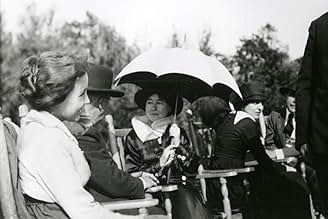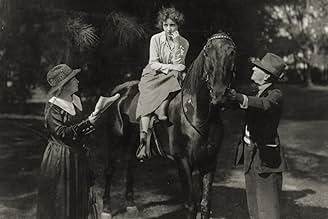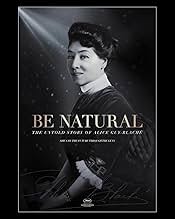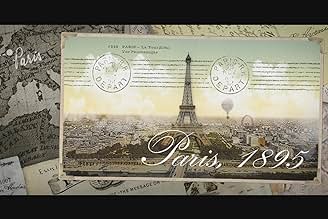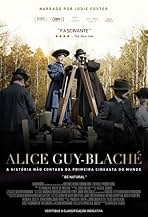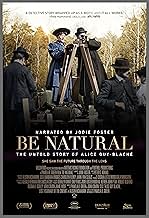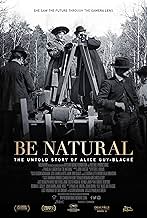Be Natural : L'Histoire cachée d'Alice Guy-Blaché
Original title: Be Natural: The Untold Story of Alice Guy-Blaché
- 2018
- Tous publics
- 1h 43m
IMDb RATING
7.7/10
1.2K
YOUR RATING
Pamela B. Green's energetic film about pioneer filmmaker Alice Guy-Blaché is both a tribute and a detective story, tracing the circumstances by which this extraordinary artist faded from mem... Read allPamela B. Green's energetic film about pioneer filmmaker Alice Guy-Blaché is both a tribute and a detective story, tracing the circumstances by which this extraordinary artist faded from memory and the path toward her reclamation.Pamela B. Green's energetic film about pioneer filmmaker Alice Guy-Blaché is both a tribute and a detective story, tracing the circumstances by which this extraordinary artist faded from memory and the path toward her reclamation.
- Awards
- 11 wins & 11 nominations total
Jodie Foster
- Narrator
- (voice)
Jon M. Chu
- Self
- (as Jon Chu)
- Director
- Writers
- All cast & crew
- Production, box office & more at IMDbPro
Featured reviews
Pamela Green has done an incredible job showcasing the works of one of the most important figures in Cinema History, Alice Guy-Blache. From the clips of her films at Gaumont to her own studio Solax, Be Natural shines a light on a woman who for decades has been largely forgotten by mainstream audiences. One of my favorite scenes in the film was watching the attempts to recreate a couple of Alice Guy-Blache's films using the same camera she used. Using a camera that needed to be cranked at just the right speed to see real time speed on film makes you appreciate how much easier it is to film things today. As a student of film history, I want every moviegoer, whether they be casual or avid, to see this film and understand what Alice Guy-Blache contributed to the world of cinema. Pamela Green shows so many clips of unseen interviews with the director herself which gives you a good understanding of how she saw her own career. She's an inspiration to all aspiring filmmakers, women espeically. In the early 20th Century, Alice Guy-Blache was a woman who not only owned her own studio, but she was also a director, producer, screenwriter and actress to name a few. She also was one of the few who experimented with sound before Warner Bros perfected it with The Jazz Singer. She experimented with color tinting, special effects, and even had interracial casting which was unheard of at the time. Amazing job to everyone involved with this film, especially Pamela Green and a big thank you to the late great Alice Guy-Blache.
Greetings again from the darkness. History can easily be distorted by those who tell it. But the work and deeds of those who make history stands the test of time, and research can often right a wrong ... or at least provide credit where it's due. Such is the case with Pamela B Greene's project to uncover the truth, and finally give pioneer filmmaker Alice Guy-Blache her rightful place in the history of cinema.
Numerous familiar faces from the movie industry flash across the screen, and most admit they have never heard of Alice Guy-Blache. Even the few that recognize the name, don't know her story. This is how the movie starts ... letting off the hook those of us who pride ourselves on knowing the basics of cinema's origins. In 1895, the Lumiere Brothers presented the first short films on their newly developed Cinematographe. In the audience that day were Leon Gaumont and his assistant, Alice Guy.
Young Ms. Guy had a creative vision for this fascinating new technology. Rather than filming "real life", she would tell stories. And telling stories through moving pictures is exactly what she did more than 1000 times across two decades and two countries. In 1896, she directed THE CABBAGE FAIRY, one of the first narrative films ... and it was only the beginning for her. Director Greene explains that so many of those early films are lost, despite being described as sophisticated, emotional, and engaging works. As she moved from France to the United States (New Jersey), Alice founded Solax with her husband, and began experimenting with sound, special effects, gender roles, and story structure.
It's truly fascinating to see the clips from many of her films, along with snippets from interviews she sat for in 1964 (before passing away in 1968). Director Greene also includes interviews from Alice's daughter Simone, while I believe are from the 1980's. Simone is able to fill in some of the gaps in the historical timeline ... a timeline that includes many familiar names. It's also a timeline that results in an abrupt end to Alice's filmmaking when she relocates back to France after the war.
How did Alice Guy-Blache get lost in history? She was a contemporary of Melies, Lumiere and the Pathe brothers. She was not just the first woman director, she was also one of the first film directors, period. Though the search continues for many of her films, Oscar winning actress Jodie Foster narrates the mission of filmmaker Pamela B Greene to right a wrong ... Alice must no longer be forgotten by the industry she helped create.
Numerous familiar faces from the movie industry flash across the screen, and most admit they have never heard of Alice Guy-Blache. Even the few that recognize the name, don't know her story. This is how the movie starts ... letting off the hook those of us who pride ourselves on knowing the basics of cinema's origins. In 1895, the Lumiere Brothers presented the first short films on their newly developed Cinematographe. In the audience that day were Leon Gaumont and his assistant, Alice Guy.
Young Ms. Guy had a creative vision for this fascinating new technology. Rather than filming "real life", she would tell stories. And telling stories through moving pictures is exactly what she did more than 1000 times across two decades and two countries. In 1896, she directed THE CABBAGE FAIRY, one of the first narrative films ... and it was only the beginning for her. Director Greene explains that so many of those early films are lost, despite being described as sophisticated, emotional, and engaging works. As she moved from France to the United States (New Jersey), Alice founded Solax with her husband, and began experimenting with sound, special effects, gender roles, and story structure.
It's truly fascinating to see the clips from many of her films, along with snippets from interviews she sat for in 1964 (before passing away in 1968). Director Greene also includes interviews from Alice's daughter Simone, while I believe are from the 1980's. Simone is able to fill in some of the gaps in the historical timeline ... a timeline that includes many familiar names. It's also a timeline that results in an abrupt end to Alice's filmmaking when she relocates back to France after the war.
How did Alice Guy-Blache get lost in history? She was a contemporary of Melies, Lumiere and the Pathe brothers. She was not just the first woman director, she was also one of the first film directors, period. Though the search continues for many of her films, Oscar winning actress Jodie Foster narrates the mission of filmmaker Pamela B Greene to right a wrong ... Alice must no longer be forgotten by the industry she helped create.
10puckamo
The director spent a decade of her life gathering evidence that Alice Guy-Blache was one of the founders of cinema, on the same level as the Lumiere Brothers, Georges Melies and Thomas Edison, and the case she makes is completely convincing. This film should be seen by everyone interested in movie history.
In "Be Natural: The Untold Story of Alice Guy-Blaché," Jodi Foster narrates Pamela B. Green's engaging, fascinating, informative, 103-minute documentary that focuses on the remarkable, obscure career of pioneering, Paris-born, first woman filmmaker Alice Guy-Blaché (1873-1968) who wrote, directed, and/or produced more than 1,000 films many with unconventional subject matter through her film production company Solax and tells her story through candid interview snippets with the groundbreaking filmmaker in 1964, excerpts from her letters, and black-and-white film clips and photographs and includes insightful interviews with filmmakers (such as Ava DuVernay, Catherine Hardwicke, Diablo Cody, Patricia Riggen, Tacita Dean, Julie Taymor, John Chu, Ann Fletcher, Liz Goldwyn, Cari Beauchamp, Cecile Starr, Anne Fontaine, Mark Romanek, Peter Farrelly, Floria Sigismondi, Kevin Macdonald, Maxine Haleff, Patty Jenkins, Michel Hazanavicius, Marjane Satpari, and Gary Mairs), actors (such as Sir Ben Kingsley, Julie Delpy, Evan Rachel Wood, Geena Davis, Lake Bell, Andy Samberg, Janeane Garofolo, and Kathleen Turner), producers Marc Abraham and Stephanie Dillain, Co-President of Roadside Attractions Howard Cohen, screenwriter Gale Ann Hurd, film critic Peter Bogdanovich, historians (such as Mark Wanamaker, Anthony Slide, Kevin Brownlow, Glenn Myrent, Alison McMahon, Naum 'Kleiman, and Alan Williams), Guy-Blaché memoirs co-editor Claire Clouzet, film preservationist Serge Bromberg, professors (such as Drake Stutesman, Jane Goenes, Henry Jenkins, Gigi Pritzker, Richard Koszaeski, and Vanessa Schwartz), journalist Jean-Michel Frodon, film editor Walter Murch, film archivist Dino Everett, facial recognition analyst Steve Wilkins, costume designer Deborah Nadvolman Landis, lecturer Roland-Francois Lick, cinematographers (such as Pierre-William Glenn, Claire Wickell, and John Bailey), film collector Murray Glass, visual effects supervisor Mark Stetson, Academy of Motion Picture Arts and Sciences President John Bailey, and granddaughter Tatiana Page-Relo.
I went to see this film following a strong review in Melbourne (Australia). However, I thought that it was very poorly assembled as a film. It seemed that the film's makers were keen to include absolutely everything they could find, and the choice of order for all these clips was baffling as well as non-stop. I will be the first in the queue to see another film made to cover the astonishing life of Alice Guy-Blache - she deserves better than this attempt.
Did you know
- TriviaOriginal written source: "Alice Guy Blaché: Lost Visionary of the Cinema", book by Alison McMahan, Bloomsbury Publishing, London, 2002, 408 p., ISBN: 978-0826451576.
- Quotes
Bob Channing: If it wasn't for people like you, she'd just remain buried.
- ConnectionsFeatures Dickson Experimental Sound Film (1894)
- How long is Be Natural: The Untold Story of Alice Guy-Blaché?Powered by Alexa
Details
- Release date
- Country of origin
- Official sites
- Languages
- Also known as
- Be Natural : L'Histoire inédite d'Alice Guy-Blaché
- Filming locations
- Production companies
- See more company credits at IMDbPro
Box office
- Gross US & Canada
- $117,511
- Opening weekend US & Canada
- $3,237
- Apr 21, 2019
- Gross worldwide
- $210,247
- Runtime
- 1h 43m(103 min)
- Color
Contribute to this page
Suggest an edit or add missing content



